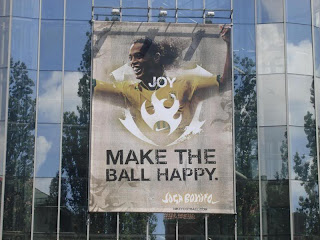The big story during World Cup 2010, besides the competency of the officiating and the French team tantrum, was whether or not the winning teams properly represented the beautiful game, or in Brazilianese joga bonito.
The phrase itself is suspicious. It sounds like something Madison Avenue cooked up to sell the sport to hausfraus around the globe. I mean… might you not reasonably conclude that only beautiful people play the beautiful game? Anyway isn’t it a bit presumptuous for soccer to proclaim itself the beautiful game? What are the rest of the world’s sports? Presumably lower on the athletic aesthetic scale. Is bowling then the ugly game?
 |
| Seminal Moment in Evolution of Bowling as a Sport |
Not surprisingly the phrase appears to have emanated from Brazil in the 50s, where soccer is a quasi-religion. Brazilians celebrate the idea that the game, well played, is an expression of their culture, and as such, must be won with style and flair—skill and inventiveness winning out over defensive caution and rude physicality. A Brazilian sees soccer as much art as sport.
A joga bonita moment occurred in the Brazil vs Ivory Coast match. Luis Fabiano took the ball out of the air with apparent guidance from his forearm, nudged it forward with his right foot, ran through defenders, flicked the ball into the air with his right foot, collected it with his chest and maybe an assist from his shoulder, and finally volleyed the ball with his left foot into back of net. It is an astonishing sequence displaying superb foot skills and athleticism. Was Fabiano in the least abashed that his brilliant score was likely abetted by two handballs? In response to this query, he said,
"But in order to make the goal more beautiful, there had to be a doubtful element. It was a spectacular goal and I believe it was not a voluntary handball. It was a legitimate goal and it was one of the most beautiful goals that I've scored in my career. Where better to score such a goal than at the World Cup?"
Ahhh...to be young and Brazilian.
Notwithstanding Fabiano’s "beautiful" goal, the word on the street is that the Brazilian team disappointed its nation. It wasn’t simply that the Brazilian team lost to the Dutch in the quarter-finals but that the team didn’t consistently display artistry and creativity. In short, it didn’t play beautifully.
Notwithstanding Fabiano’s "beautiful" goal, the word on the street is that the Brazilian team disappointed its nation. It wasn’t simply that the Brazilian team lost to the Dutch in the quarter-finals but that the team didn’t consistently display artistry and creativity. In short, it didn’t play beautifully.
Apparently this was in large part a reflection of its coach, Dunga, a former defensive-minded midfielder, who brought a no-nonsense, pragmatic style of play to the Brazilian side. He favored unusually robust players—his squad averaging a shade under six feet tall, one of the largest teams at the World Cup. Not that his players didn’t have skills…just watch Robinho, Kaka´, and the aforementioned Fabiano work magic with the ball at their feet. Still, the consensus is that Dunga would rather have a clean sheet than a beautiful game, and when, ultimately, he didn’t deliver either in the quarter-finals, he was handed his walking papers.
[Dunga responded to his critics that they are guilty of collective selective memory, i.e,, that they overrate the artistry of past Brazilian teams. The key thing was Brazil won World Cup titles.]
Circling back to my starting point…it seems FIFA, or perhaps Nike, would like to co-opt the beautiful game as a marketing slogan to promote the sport around the world. Among the soccer cognoscenti, however, the phrase has a much more selective meaning and most soccer teams don’t measure up—apparently the beauty of the beautiful game is very much in the eyes of the beholder. In any case the Brazilian game--beautiful or not--didn't make it to the World Cup finals, whereas the decidedly unartistic Dutch game did.


No comments:
Post a Comment